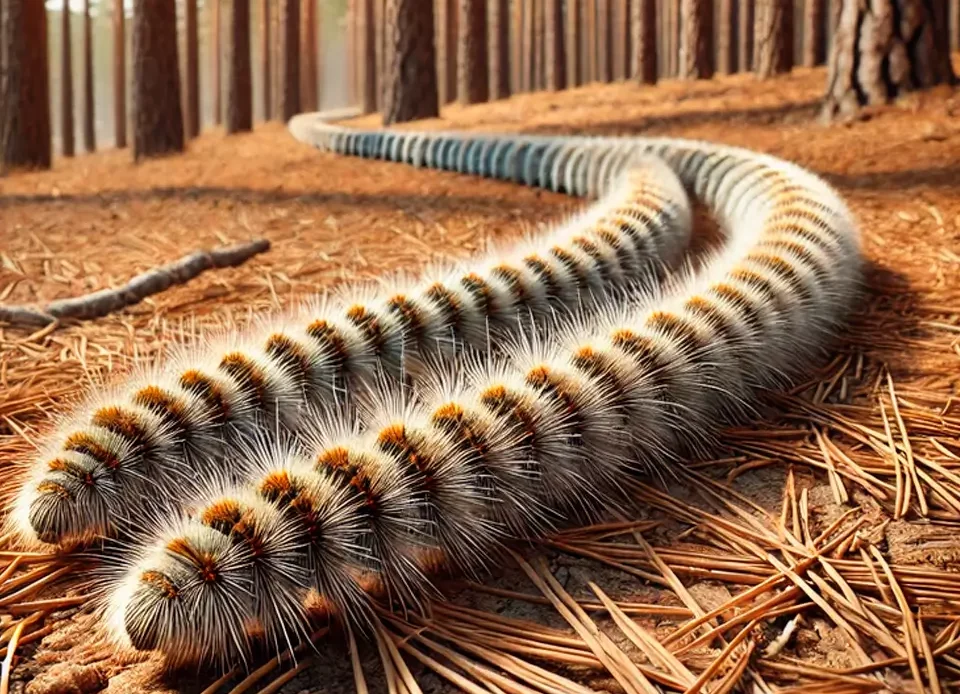The pine processionary (Thaumetopea pityocampa) is a forest pest that affects thousands of gardens and wooded areas in Mallorca every year. This insect, known for its characteristic caterpillars that move in single file, is a threat not only to trees, especially pines, but also to the health of pets and humans due to the urticating hairs they shed.
If you have a garden in Mallorca, it is crucial to understand the dangers posed by the processionary, how to detect it, and what measures you can take to protect your plants, pets, and loved ones.
Life Cycle of the Pine Processionary
The pine processionary has a complex life cycle that develops in four main stages: egg, larva (caterpillar), chrysalis (pupa), and adult (moth). Understanding this cycle is essential to detect the pest at its different stages and act at the right time.
- Egg: Eggs are laid in large masses on pine branches between July and September. Adult moths choose tall trees where the larvae have a higher chance of survival.
- Larva (caterpillar): After hatching, the larvae begin to feed on pine needles. It is during this phase that the caterpillars cause the most damage to the trees and become a health threat due to the urticating hairs they develop in the later larval stages. These hairs can be carried by the wind or direct contact, causing severe allergic reactions in humans and animals.
- Chrysalis (pupa): After feeding, the caterpillars descend from the tree and bury themselves in the ground to pupate. This is a critical moment as the caterpillars form the famous “procession,” moving in a line to find the right place to bury themselves.
- Adult (moth): The adult stage of the processionary is a short-lived nocturnal moth (a few days), whose sole purpose is to reproduce and begin the cycle again.
How the Processionary Affects Your Garden in Mallorca
1. Damage to Trees
Pine processionary caterpillars feed on the needles of pine trees, significantly weakening them and making them vulnerable to other pests or diseases. A pine tree infested with processionary caterpillars can lose a large number of its needles, affecting its growth and, in severe cases, leading to its death. This not only reduces the beauty of your garden but can also compromise the tree’s structure, increasing the risk of falls and damage during storms.
2. Danger to Pets and Humans
One of the biggest dangers of the pine processionary is its impact on human and animal health. The urticating hairs released by the caterpillars contain toxins that can cause severe allergic reactions, such as skin irritation, eye problems, and respiratory issues. In animals, especially curious dogs that tend to sniff the ground, these hairs can cause necrosis of the tongue and, in extreme cases, death if not treated in time.
3. Risks for Children and People Outdoors
If you have children or enjoy your garden in the spring months, the processionary can pose a significant danger. Accidental contact with the caterpillars or their nests can cause severe hives, conjunctivitis, and even serious respiratory problems, especially in sensitive individuals.
Detection and Prevention of the Pine Processionary in Mallorca
1. Regular Tree Inspections
One of the best ways to prevent an infestation is to regularly inspect your pines and trees. During the winter, processionary nests are visible in the upper branches of trees as large white silk bags. If you spot these nests, it’s crucial to act before the caterpillars descend to the ground in the spring.
2. Pruning and Nest Removal
Pruning infested branches is an effective measure if done during the winter months. It is recommended to remove processionary nests with great care and always using appropriate protective equipment to avoid contact with the urticating hairs.
3. Use of Pheromone Traps
Using pheromone traps is an eco-friendly and effective preventive technique. These traps capture adult moths before they can mate and lay eggs on the trees. Although they do not completely eliminate the pest, they are an excellent tool to reduce the population of processionaries around your garden.
4. Phytotherapeutic Treatments
In large gardens or areas where the processionary is a recurring problem, phytotherapeutic treatments based on nematodes or Bacillus thuringiensis are an effective option. These biological products directly attack the caterpillars without harming the rest of the ecosystem’s living beings.
5. Protection for Animals and Humans
During the critical spring months, when the caterpillars descend to the ground, it is essential to limit access to infested areas, especially for children and pets. If you live in a high-risk area, consider fencing off your garden or supervising your animals during this time.
Solutions to Control the Processionary in Your Garden
1. Professional Intervention
In cases of severe or recurring infestations, it is best to contact pest control professionals like our gardening company in Mallorca. We have the equipment and experience to safely and efficiently eliminate the pine processionary, minimizing risks to you, your family, and your plants.
2. Biocontrol with Natural Predators
Another effective method is to encourage the presence of natural predators such as insectivorous birds or bats in your garden. Installing nesting boxes for birds can help reduce the population of processionary caterpillars naturally and without chemicals.
3. Ground Traps
Once the caterpillars begin their descent to bury themselves in the ground, ground traps can be a useful tool to capture them before they complete their cycle. These traps are easy to install around tree trunks and can prevent future infestations.
Conclusion and Advice
The pine processionary is a dangerous and harmful pest that requires attention and control, especially on an island like Mallorca, where pines are a predominant species. Timely detection of symptoms and taking preventive measures can save your trees, protect your pets, and keep your family safe. Don’t hesitate to contact us if you need professional help controlling the processionary in your garden. Maintaining a healthy garden is key to fully enjoying the natural beauty of Mallorca.

